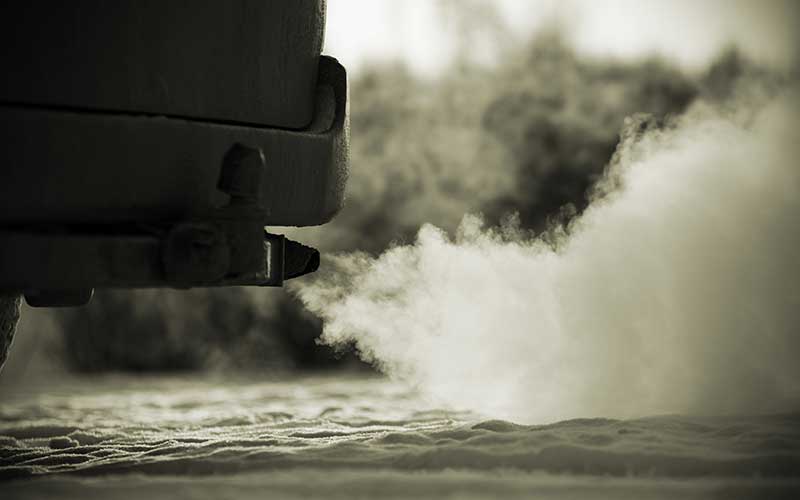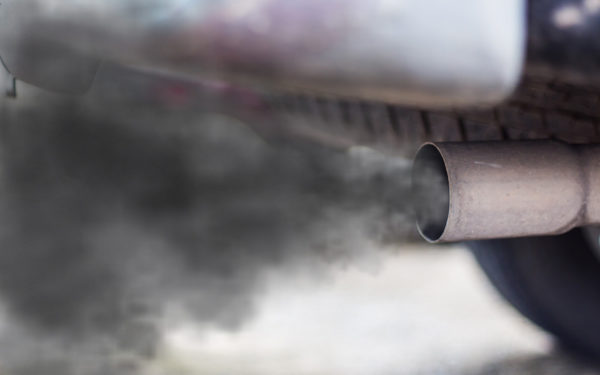
Exhaust fumes from idling vehicles are a hidden menace making our communities sick. Photo: Jarhe Photography via Shutterstock
Seeing vehicles parked by the curb with their engines running is a pretty common sight for most of us. It’s especially common in cities and densely populated neighborhoods, where cars, SUVs, school buses, and garbage and delivery trucks idle at all hours of the day.
But what we often don’t realize is that the tailpipe pollution from all of this idling wreaks havoc on our environment and our health. Across New England, air quality is getting worse and worse because vehicles are left running for no reason.
The thing is, each state has laws on the books to prevent excessive idling and the harm it causes – however, they’re rarely enforced. We can’t continue to ignore this preventable threat to the health of our communities. That’s why CLF is stepping in to enforce the law and stop tailpipe polluters from spewing their toxic exhaust fumes into our neighborhoods.
Diesel Exhaust Clouds Our Air with Pollutants
All tailpipe pollution is a problem, but diesel fumes from idling cars, trucks, and buses are especially harmful. Not only can they contribute to climate change, but they also have been linked to a myriad of health problems such as asthma, emphysema, lung cancer, and heart disease.
Unlike the pollutants cars and trucks give off while they’re being driven, however, those released by idling vehicles build up in small amounts of space. This creates “hotspots” of dangerously contaminated air wherever a vehicle is parked and running. That is bad news for anyone who lives, works, or plays near idling vehicles – which is practically everyone.
Tailpipe pollution might not seem like a severe environmental concern if you only consider your neighbor idling in their driveway on a cold winter morning. But imagine an entire fleet of buses idling every morning outside of your child’s school, or the cumulative impact of every commuter in New England warming up their car before work. Those “small” incidents of idling add up to a huge amount of pollution and are the leading source of dangerously low air quality across the United States.
Tailpipe Pollution Harms Some Communities More than Others
The effects of tailpipe pollution are far-reaching. However, it doesn’t impact everyone equally. Places where idling is most common, like densely populated neighborhoods with public bus stops and parking lots, are often located in low-income communities and communities of color. These communities already suffer higher rates of asthma and other respiratory illnesses compared to wealthier areas, and they’re made even worse by diesel exhaust pollution.
Children are also especially vulnerable because their lungs are still developing and they inhale more air per pound of body weight than adults. Yet school buses are some of the worst idling offenders. Air monitoring at schools has shown elevated levels of air toxics coinciding with school pick-up times. Further, bus rides themselves are often toxic.
When a bus idles before picking up students, pollutants build up in the bus’s cabin. That means a child riding that bus may be breathing as much as eight times the amount of diesel exhaust permissible by federal pollution standards. With 95 percent of school buses nationwide still running on diesel, most children who ride the bus to and from school likely suffer from this dangerous exposure every single school day.
As the mother of two young children, I find it inexcusable that the buses we trust to transport our children to school every day are polluting the very air they breathe.
“Anti-Idling” Laws Are on the Books, but They Are Protecting No One
Concern about the dangers of tailpipe pollution has resulted in anti-idling laws nationwide. Massachusetts, for example, limits unnecessary idling to five minutes; some state prohibitions are even more stringent. Police officers and health officials can enforce these laws and have steep penalties that go with them.
But these laws are rarely enforced. Meanwhile, people in New England are driving more and more miles each year, and congestion rates are higher than ever, leaving us all vulnerable to increasing tailpipe pollution and its harmful health effects.
We’re Holding Polluters Accountable to the Law
These laws can and must be enforced. That’s why CLF is stepping in to hold New England’s biggest tailpipe polluters accountable. We’re starting with Transdev Services, which provides transportation for the Boston Public School system. Its buses have been idling illegally in parking lots across the city, sometimes for upwards of 30 minutes at a time. We can’t continue to allow Transdev to ignore the law and put our children and communities at risk.
We all have the right to clean, healthy, safe air. Thank you for standing with us as we take on this fight.



